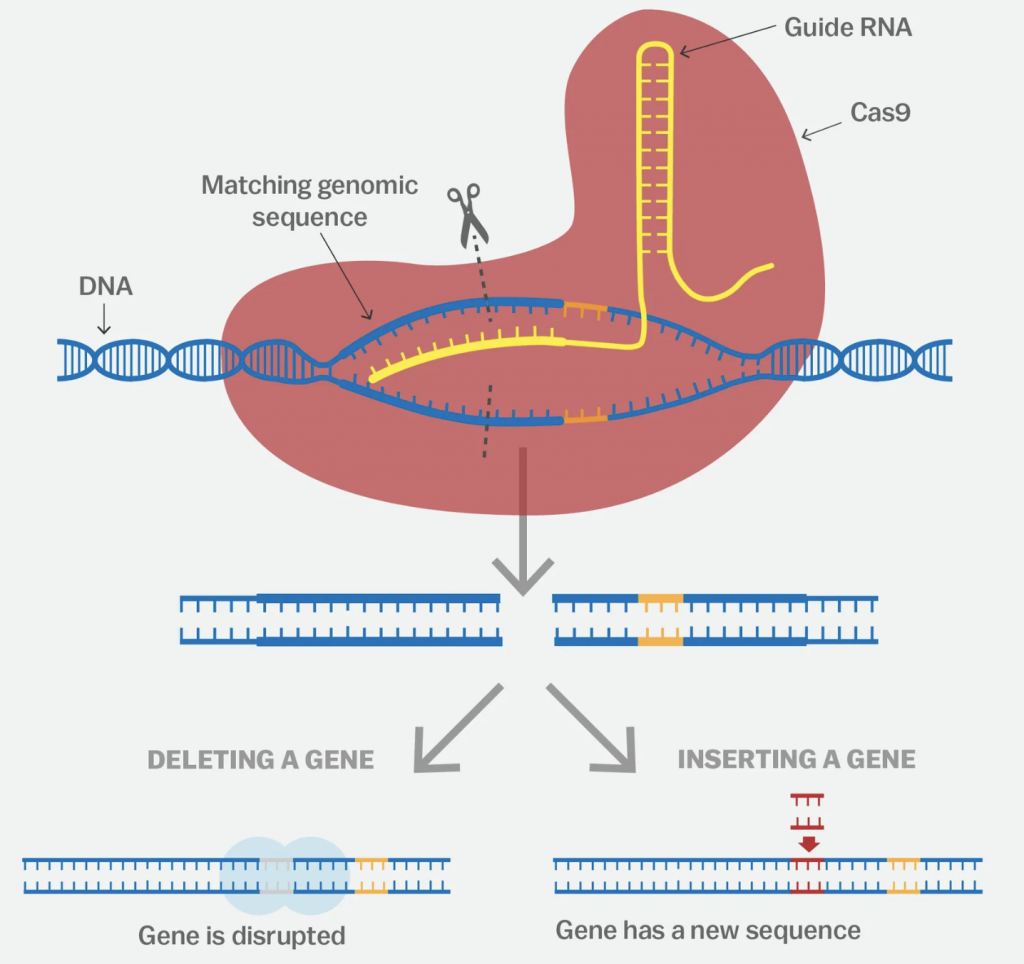Humans are incredible. We can create new technologies, reshape the world, and even engineer ourselves. Being a biomedical sciences student with a love for genetics, I was utterly fascinated in our ethics workshop when the topic of genetic engineering arose. Our genome defines everything, from how our organs develop to little things like whether you have attached or unattached earlobes. But if we start editing this, are we still human?
The basics
After first being described in 1987 by researchers at Osaka University, CRISPR (clustered regularly interspaced short palindromic repeats) were found in the DNA sequences of E. Coli, which naturally occurs in bacteria as an antiviral tool. 18 years later, in 2005, the Cas9 nuclease was first described; with that, the CRISPR-Cas9 system was created.
CRISPR-Cas9 acts as a ‘cut and paste tool’ for our genome.
How to edit a gene (simplified):
- Identify a genetic sequence you want to edit, for example, a sequence that causes disease.
- Program the CRISPR system with the gene and combine it with cells.
- The Cas9 nuclease protein can locate and cut the gene out, allowing the target gene to be edited or removed and replaced.
This system works precisely and enables specific genes to be, targeted and edited. But as ever, with new powers comes new responsibilities.
The power
I have seen the effects of a genetic condition first-hand. Both my sister and mum have a condition called Stickler Syndrome, caused by a mutation in one gene, COL2A1. This one mutation causes all the collagen in their bodies to be faulty. This has led to many complications but most prominently within their eyes. They have faced retinal tears and detachments due to the lack of collagen in their sclerae. Their COL2A1 gene could be edited with genetic engineering, and their bodies would produce working collagen.
Despite affecting me personally, I believe CRISPR-Cas9 will change the world when applied correctly and ethically. Not only a world without disease, but it could lead to so much more. For example, humans that are resistant to cancer or ageing.
This video explores all the amazing future applications of CRISPR-Cas9.
The responsibility
As with all novel scientific developments, with must discuss bioethics. The key ethical issue with genetic engineering is that it would be applied directly to humans. After the Nazi Nuremberg trials, international bioethics guidelines on medical experiments on humans were set out within the scientific community. Despite only editing a specific gene, predicting the effect on the rest of the patient’s genome is difficult. As well as this, we are unable to know how this genetic editing will affect future generations.
Not only are there ethical issues with experimenting on living people, but there is an issue with where we draw the line. If we can make ourselves free of genetic disease, what stops us from editing our genome to make us more beautiful or intelligent?
Conclusion
To conclude, genetic engineering is a positive thing for humanity. What makes us human is the desire to continue to improve our lives and the lives of others. Genetic diseases, cancers, and other related issues cause unnecessary suffering. If we have the technology to prevent this, we should.
Humanity has been evolving for 300,000 years and will continue to for years. Genetic engineering is the next step in human evolution. However, I believe that we should only use CRISPR-Cas9 for healing, not for aesthetics and that it should be tightly regulated to prevent abuse of this powerful system. I cannot wait to see what else we will achieve with genetic engineering.


This is an initially reflective and well researched blog showing how you have chosen to explore the emerging field of…
This is a good attempt at a blog, where you reflect on your recent learning at a lecture/workshop to describe…
This is a fair to good blog, reflecting on your recent learning in some of your modules. You provide a…
This is an engagingly written and reflective blog focussed in general on ethics in medicine. You might improve by citing…
This is a good and well written an presented blog on an original subject - biofilms on implants. You explain…